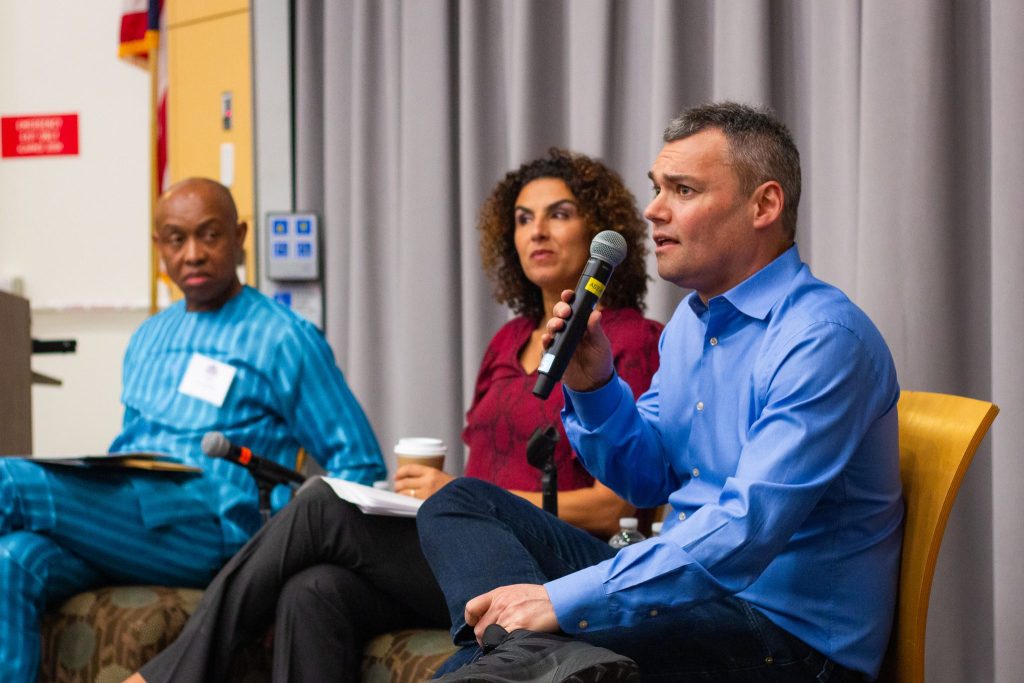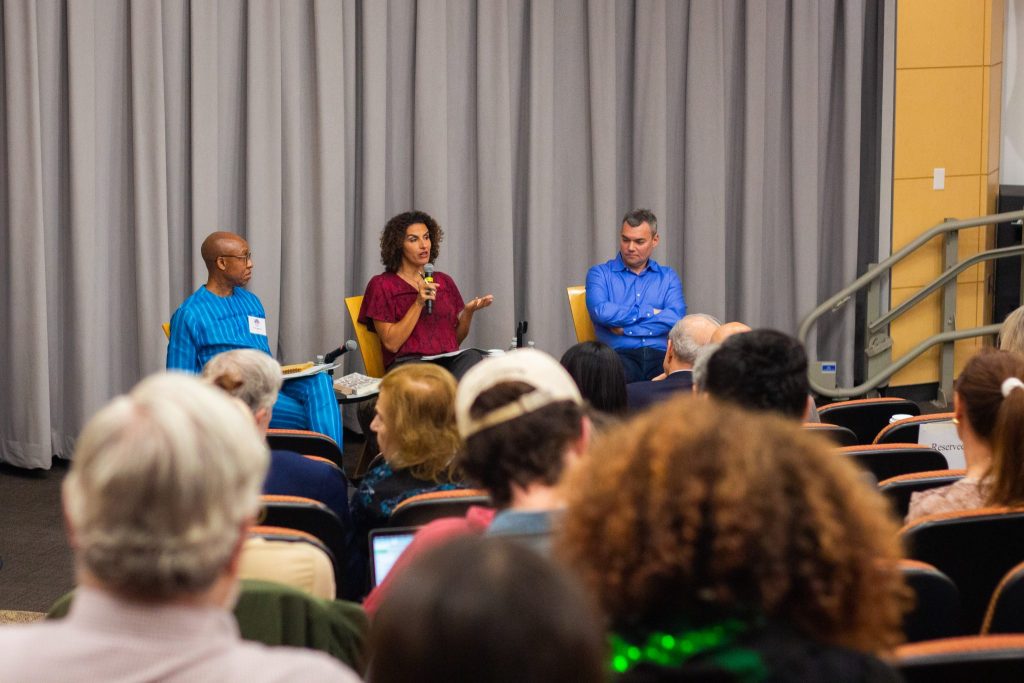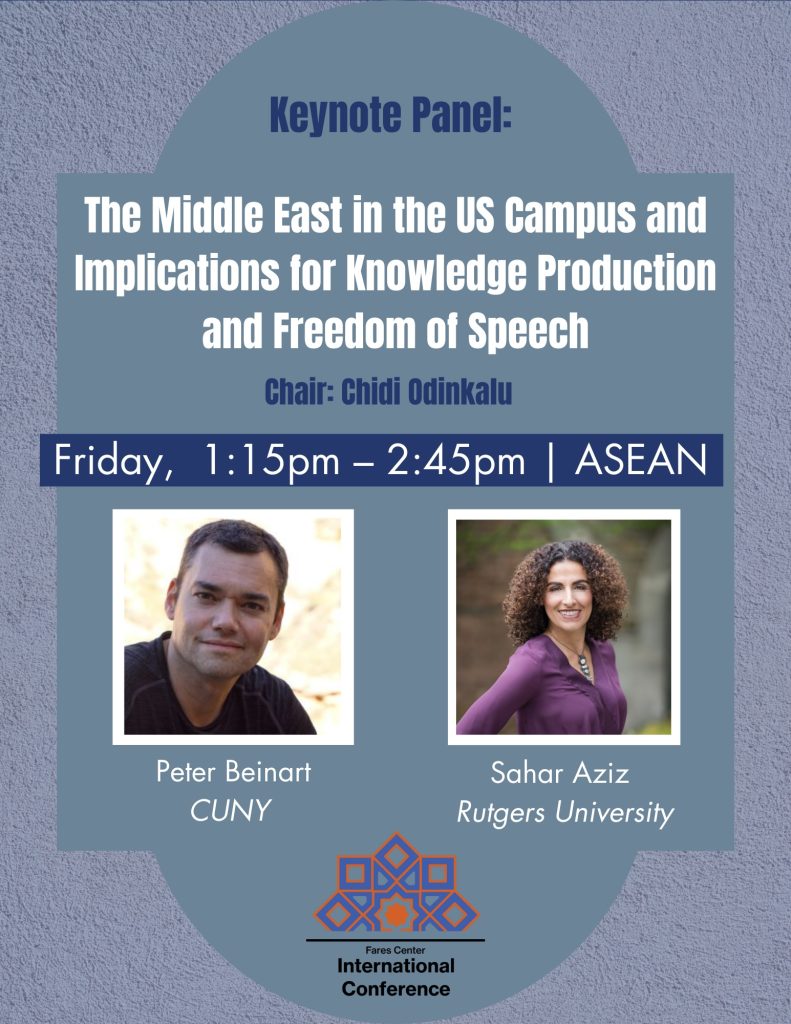Sahar Aziz and Peter Beinart: Keynote Panel at the Fares Center International Conference 2024
Keynote speakers Sarah Aziz and Peter Beinart joined Day 2 of the Fares Center International Conference to discuss “The Middle East in the US Campus and Implications for Knowledge Production and Freedom of Speech.” The keynote was chaired by Chidi Odinkalu, Professor of Practice in International Human Rights Law of the Fletcher School. Odinaklu opened the session by providing context for the political moment in which the conference took place, describing the growing intolerance across the United States in general, and on the American college campus in particular, for acts of political expression with regard to the Israel-Gaza war and the US involvement therein. Odinkalu described the concerning trend of self-censorship in university faculty and student activity out of fear of professional and reputational damage, as well as the increasing tendency toward de-platforming those with differing opinions, at the expense of a rich university environment of learning and exchange. As students and high-profile administrators are targeted for their political stances on Israel-Palestine, Odinkalu affirmed that “vigorous and robust debate is not incompatible with mutually tolerant exchange that is also respectful of diversity.”
Sahar Aziz is the founding director of the Center for Security, Race and Rights at Rutgers University, and focuses, in her scholarship, on the intersection of national security, race, religion, and civil rights. In her remarks, she provided a primer on the First Amendment, Title VI, Title IX, and other free speech protections available in the United States in both public and private universities, and grappled with the question of how to engender an environment of tolerance and mutual respect while maintaining the rights of those engaged in speech that other groups could find offensive. Aziz made particular reference to the idea of the ‘Palestine exception,’ in which speech, education, and activism in support of Palestinian human rights is subjected to special scrutiny and censorship by actors across the political spectrum. Aziz issued a challenge to university administrators, asking that they serve the interests of their students, rather than those of their donors, Board of Directors, or even members of the US Congress.
Peter Beinart is professor at the Newmark School of Journalism at the City University of New York, the Editor-at-Large of Jewish Currents, and a political commentator. Beinart echoed concerns regarding the assurance of free speech, claiming that the greatest threat comes from the political right, which employs coercive state power and resources to obstruct free expression. Beinart noted the frequent weaponization of accusations of antisemitism to stifle political speech and action regarding Israel-Palestine, arguing that many claims of antisemitism do not originate from genuine concern for the welfare of American Jews and American Jewish students, but rather to ensure continued US support for Israel. Beinart argued that underlying the issue of free speech about Israel-Palestine is the more substantive question about the legitimacy of Jewish statehood itself, and the relationship the United States and Americans should have to the model of ethnonationalism, legalized social hierarchies, and supremacy that Israel presents. The stakes of this question, Beinart argued, relate not only to the future of Israel-Palestine, but to that of a multicultural American democracy.
The keynote panel featured a robust Q&A session, in which Aziz and Beinart compared the current state of free speech and knowledge production to the historical period of McCarthyism in the US, contextualized today’s threats to free speech within the Islamophobia of the post-9/11 era and the legalized mechanism of corruption within the American political system, and explored what politicians, university leadership, and students can do to enable a more nuanced and critical approach to discussing US policy in the Middle East alongside more localized questions of ideology and identity.



Sahar Aziz’s scholarship examines the intersection of national security, race, religion, and civil rights with a focus on the adverse impact of national security laws and policies on racial, religious, and ethnic minorities. She is the author of the book The Racial Muslim: When Racism Quashes Religious Freedom and the founding director of the Center for Security, Race and Rights. Professor Aziz is a recipient of the Derrick A. Bell Award from the Association of American Law Schools and was named a Middle Eastern and North African American National Security and Foreign Policy Next Generation Leader by New America in 2020 and a Soros Equality Fellow in 2021.
Peter Beinart is Professor of Journalism and Political Science at the Newmark School of Journalism at the City University of New York. He is also Editor-at-Large of Jewish Currents, an MSNBC political commentator, a frequent contributor to The New York Times, and a Non-Resident Fellow at the Foundation for Middle East Peace. He writes the Beinart Notebook newsletter on Substack.Com


